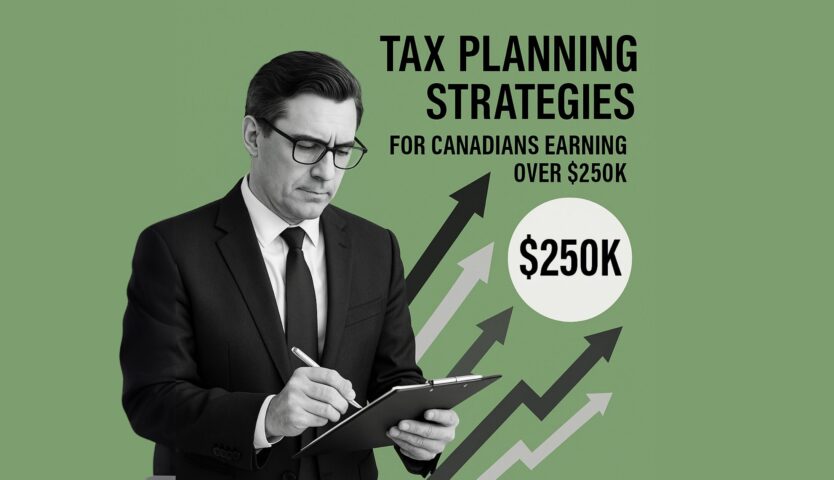Earning over $250K puts you in a higher tax bracket, and that means smart planning can make a big difference.
High-income tax planning isn’t just about minimizing what you owe; it’s about making strategic choices that align with your financial goals.
At Liu & Associates, we help high earners understand their options and take advantage of the tools available to them.
With the right approach, you can stay compliant while keeping more of what you’ve worked hard to earn.
The Impact of Canada’s Progressive Tax System
Canada’s progressive tax system means the more you earn, the higher your marginal tax rate.
For individuals earning over $250K, this can result in a significant portion of income being taxed at the top federal and provincial rates.
Each additional dollar earned above certain thresholds is taxed at a higher rate than the last.
This structure can create opportunities for strategic planning, especially when it comes to timing income, using deductions, and optimizing investments.
Income Splitting and Family Trusts: What’s Legal and Effective
For high earners, income splitting can be a powerful tool—but only if done within the rules.
Structuring income through family trusts or corporations allows funds to be shared with lower-income family members, reducing overall tax liability.
With careful planning and proper documentation, these strategies can be both effective and fully compliant with CRA standards.
Attribution Rules and CRA Guidelines
The CRA closely monitors income splitting through attribution rules, which are designed to prevent tax avoidance.
These rules can reassign income back to the high-income individual if certain conditions aren’t met.
Knowing how these guidelines apply is crucial before involving family members in any financial arrangement.
When Family Trusts Make Sense
Family trusts are most effective when there’s a long-term strategy, such as funding a child’s education or passing down business income.
They allow income to be distributed among beneficiaries in lower tax brackets, creating potential tax savings.
Trusts also offer flexibility and some protection for family assets.
Paying Salaries and Dividends to Family Members
High earners with incorporated businesses may consider paying reasonable salaries or dividends to spouses or adult children.
This can shift taxable income to family members in lower brackets, provided the compensation is justifiable for the work performed.
Proper documentation and fair market value assessments are essential to avoid scrutiny.
Maximizing RRSPs, IPPs and Corporate Investment Accounts
When your income pushes past $250K, it’s not just about saving, it’s about structuring that savings for long-term efficiency.
High earners have access to tools that go beyond basic retirement planning, offering significant tax deferral and wealth-building opportunities.
The key is using the right mix of personal and corporate options based on your income type and financial goals.
- RRSP Contribution Strategies for High Earners: Time deductions to offset income in your highest-earning years or avoid bumping into top tax brackets.
- Individual Pension Plans (IPPs) for Incorporated Professionals: Create larger retirement contributions than RRSPs allow, with additional corporate tax benefits.
- Using a Holdco or Investment Corp for Tax Efficiency: Defer personal taxes by reinvesting retained earnings inside a corporation at lower tax rates.
Each of these strategies plays a different role, and the most effective plan often involves combining several to reduce tax today while building wealth for tomorrow.
Real Estate and Passive Income Considerations
For high-income Canadians, real estate and other passive income sources can provide both diversification and long-term growth, but they also come with different tax rules.
From rental income to capital gains to corporate-held investments, how you structure and report these earnings affects your overall tax position.
Taking a strategic approach helps you keep more of what your investments generate.
- Capital Gains vs. Rental Income Taxation: Understand the tax differences between appreciation and rental cash flow to guide how you buy and sell property.
- Using Leverage and Depreciation Strategically: Reduce taxable income through deductible interest and capital cost allowance while maximizing long-term value.
- Passive Income in Corporations and the Small Business Deduction: Keep an eye on passive income thresholds that can limit access to lower corporate tax rates.
Real estate and passive income strategies aren’t one-size-fits-all.
Your income mix, corporate structure, and investment goals all influence what works best.
Working with a Tax Professional for Strategic Planning
When your income reaches higher levels, tax planning becomes more complex and more important.
A tax professional brings clarity to rules, opportunities, and risks that may not be obvious at first glance.
Partnering with the right advisor means fewer surprises and smarter decisions throughout the year.
When to Bring in a Tax Advisor or Accountant
If your income has recently increased or your financial situation has become more complex, it’s time to talk to a professional.
Major life events like incorporation, buying property, or setting up a trust also warrant expert input.
The sooner you bring someone in, the more flexibility you have in your planning.
What a Tax Professional Can Do For You
A qualified tax advisor can identify deductions, structure income efficiently, and help reduce your overall tax burden.
They’ll also flag potential audit risks and keep you up to date with current legislation.
Their insight helps align your tax strategy with your short- and long-term financial goals.
What to Expect from a Tax Planning Review
A planning review typically starts with a deep dive into your income sources, business structure, and current tax strategies.
You’ll receive tailored recommendations based on your goals, risk tolerance, and opportunities to optimize.
Expect a clear plan of action and ongoing support as your situation evolves.
High Income Tax Planning That Works for Your Goals
When your income puts you in the top tax bracket, proactive planning is essential.
The right strategies can reduce your tax burden, protect your assets, and support long-term growth, both personally and through your business.
At Liu & Associates, we specialize in high-income tax planning tailored to your financial situation.
Contact us today to book a consultation and start building a smarter tax strategy.
